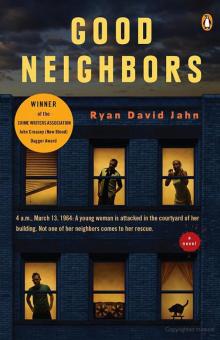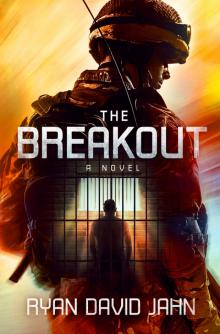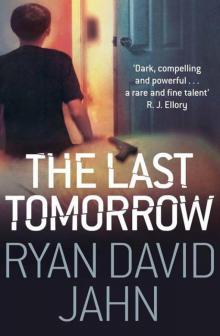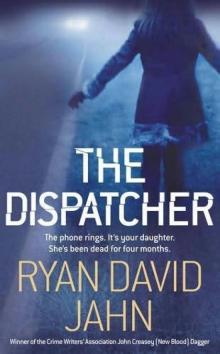- Home
- Ryan David Jahn
The Breakout Page 4
The Breakout Read online
Page 4
White Carrara marble lined the foyer. Beyond it lay a recessed living room with Macassar ebony floors, a hand-woven area rug rolled out across the wood, the room furnished with a coffee table and three couches.
Beautiful women lay across the couches, two on each of them, their legs tangled together. They were still awake from last night, not up early, lazily watching the sixty-inch Samsung HDTV mounted on the south wall above the never-used fireplace. The women glanced toward him as he stepped inside, one of them saying, “Welcome home, Alejandro.” He nodded his greeting and they turned back to the TV. They didn’t even notice the blood on his clothes. Or perhaps they knew better than to ask.
He glanced at the screen, saw they were watching Daniel Craig in Casino Royale. He watched for a moment himself before heading to the right, where a spiral staircase would take him to the second floor.
He walked upstairs and made his way down a long door-lined hallway to the master bedroom. As soon as he stepped through the door he began stripping himself of his seersucker suit, dropping clothes to the wood floor. Once he was naked he walked to the bathroom and turned on the cold water in the shower. He stepped under its spray. Washed himself, spat blood into the metal drain, brushed his teeth, shaved with a Panasonic wet-dry electric razor, and stood with his face tilted toward the showerhead, eyes closed, the spray massaging his eyelids and cheeks.
Several minutes passed.
Finally he turned off the shower, pushed through the glass door, stepped onto the thick bathmat, and grabbed an Egyptian cotton towel from the heated rod. He dried himself off and tossed the towel to the floor. He returned to the bedroom, pulled a pair of blue Armani bikini briefs from the top left drawer of his dresser. Stepped into them, slid them up—adjusting himself in the front pocket—and walked to the balcony. Opened the French doors and stepped out into the day, the tile cool beneath his feet. He squinted into the distance. The sun was now hovering above the horizon, the morning shadows stretched out long, pointing in his direction.
Beyond the Olympic-sized swimming pool and the well-kept lawn, beyond the clay tennis court and the cedar-enclosed backyard shower, beyond the koi pond and the guesthouse, beyond the back wall of the estate and the four armed guards posted along it, the desert stretched out for miles, heat vapors already beginning to distort the air with their wavering dance. Mesquite and guayule and ocotillo erupted from the orange sand. Rattlesnakes lay stretched out on boulders. Tarantulas hid in the shade under the shrubs. Lizards scurried.
He looked down at the pool area. Several women in bikinis lay in tanning chairs—some up early, some up late—drinks beside them on small glass-topped tables, lipstick-stained cigarettes angled in ashtrays sending ribbons of smoke into the desert air. Yet another woman was sitting on the pool’s verge, her feet in the water kicking lazily, sending ripples out through the otherwise glassy surface.
He stood there for a long time before he turned, walked inside, and grabbed a Glock 22 from his dresser. He walked out of the bedroom and made his way downstairs to the kitchen. Pulled open the stainless steel refrigerator’s top drawer, grabbed a Corona, popped the top with a bottle opener screwed into the wall, and headed out to the pool.
He took a drink of his beer, walked to an empty tanning chair, and lay down. He moved his Glock hand to his lap and rested it there. Glanced to his right. A fringe-toed lizard crawled along the concrete, moving toward the back of the property. Alejandro took another sip of beer, aimed, and fired. The gun kicked in his hand. The lizard vanished. One second it was there. The next it was gone. All that remained was a small triangular streak of blood on the concrete, making it look as though a ketchup packet had been stomped.
Several of the girls jumped and screamed.
Alejandro laughed, took another sip of his beer, and lay back again. He closed his eyes and let the heat of the sun warm his face. The insides of his eyelids were red.
* * *
Diego Blanco and Gael Morales drove through the west side of the city in a white Ford Econoline van. They weaved their way up and down the grid of the slums, looking for a kid named Paco. Skinny little punk about eighteen years old with a pathetic twelve-hair mustache, liked to wear Dodgers baseball caps backward. They’d been cruising the streets for almost an hour but had yet to see him. Diego tongued the toothpick in his mouth and thought about knocking a few heads together, asking questions, but the problem was that word might reach Paco before they did. If that happened, he’d run, and the last thing Diego wanted was to have to track him down in Juarez. He’d be damn near impossible to find, but Alejandro would demand it be done.
He scratched at the scar on the top of his right ear and turned left onto Avenida Violeta. They rolled toward a McDonald’s.
“You hungry?” Diego asked in Spanish.
“A little,” Gael said. “All I had this morning was a Pop-Tart.”
Diego pulled into the McDonald’s parking lot, rolled to the back of the six-car drive-thru line, and said: “What do you want?”
“Huevos con jamon.”
“We’re driving. No fork food.”
“Then a McMuffin. What are you getting?”
“McMolletes.”
“Coffee?”
“Yeah. You?”
“Orange juice. No. A small Coca-Cola with extra ice.”
“For breakfast?”
Gael shrugged. “I like Coca-Cola.”
The line moved forward. Diego glanced left to the building and saw Paco sitting at a table in front of the dust-covered picture window, shoving a cuernito de jamon y queso into his idiot face. He had on a backward baseball cap and a white jersey. He took a bite, slurped coffee, then—possibly feeling himself being watched—glanced out the window. For a moment he looked out blankly. Finally, their eyes locked, but neither of them moved. Recognition and fear transformed Paco’s face. He panicked, got to his feet, and ran, abandoning his breakfast on the Formica table.
“Cabeza de mierda.”
Diego slammed the transmission into park, shoved out of the van, leaving the driver’s-side door open, and went running around to the front of the stucco building. Paco shoved through the front door just as Diego turned the corner, glanced toward him, and darted in the opposite direction, heading down Calle de Oro. Diego chased after him, staring at the KERSHAW on the back of the kid’s jersey. He pulled a pistol from his waistband while he ran.
“Stop or I’ll fucking kill you!”
But Paco didn’t stop. He pivoted right, down Avenida la Cruz, losing one of his untied Jordans as he turned the corner. The shoe flipped end over end before settling on its side.
Diego kicked the shoe out of his way and continued to chase the little shit, knowing he couldn’t shoot but wanting to put an end to this. Kid might have to die, but that was Alejandro’s call, not his. He’d been tasked with delivering Paco alive and that was what he’d do.
He stumbled over a second shoe as he ran and almost fell. Kid must have kicked it off after losing the first. They continued south, the distance between them growing. Diego was too old for this, too fucking fat, but if he lost Paco, he’d be in the shit up to his nostrils. So he ignored the stitch in his side and worked up to a full-on sprint.
They ran toward Calle Fidel Avila, Diego slowly gaining on his prey. Kid started across the street but only made it halfway before the Ford Econoline screeched into the intersection from the west and slammed into him.
Paco went sprawling onto the cracked asphalt, head slamming against it even as he slid across the rough surface. Gael Morales shoved out of the driver’s-side door, hurried to the kid, and pulled him to his feet by the collar of his jersey.
Diego caught up with them, out of breath, glad it was over.
“That’s one way to do it.”
“I know you hate to run.”
Diego took over. Bashed Paco in the head with his pistol, grabbed a fistful of hair, and dragged him to the van. Kid’s left arm and cheek were covered in road rash, blood beginning to seep from
the shallow wounds. A patch of hair had been road-shaved from his head. Pieces of gravel were embedded in his flesh. But Diego was hardly inclined to feel sympathy. Little hijo de perra had made him run, and as Gael had mentioned, he fucking hated to run. He slid open the back door and shoved Paco inside. Followed him in, keeping his pistol aimed. Kid sat on the bench seat and Diego sat beside him.
“Please,” the kid said.
“Yo cago en la leche de tu puta madre.”
Gael leaned in through the sliding door. “You want me to drive, then?”
“If you don’t mind.”
Gael nodded, slid shut the door, and walked around to the driver’s side.
Gael Morales had been on Alejandro’s payroll a little more than six months now. He was about thirty years old, thin, maybe five foot eight, handsome, with dark skin and large green eyes—which meant one of his parents was probably white—wore Original Penguin polo shirts and cuffed raw-denim Levi’s almost every day, smoked unfiltered Camels, and was always spitting flecks of tobacco from the end of his tongue. Said he smoked unfiltered because other people hated them. Meant nobody tried to bum.
Diego liked the guy. He was up for just about anything, didn’t ask too many questions, and didn’t cause trouble. Pretty soon, once Alejandro was comfortable with him, he might make real money. Until then, Diego slipped him a little extra on the side, just to make sure he stuck around. Guy like him would be able to make money somewhere and Diego wanted it to be here.
It was hard to find good men.
* * *
Alejandro’s guys dragged Paco into the backyard. He heard them before he saw them, turned his head, and squinted as they hauled the kid through the gate at the side of the house. They dragged Paco toward him, one on each arm, and when they arrived shoved him forward. Kid was crying, tears streaming down his face.
“Lo siento, lo siento, lo siento.”
“Puse mi polla en la boca para que te callas.” He said it softly, almost as if he were comforting the kid rather than telling him he’d put his dick in his mouth to shut him up, but that didn’t matter. Kid pissed himself, a dark splotch spreading across the front of his jeans, liquid dripping from his pants and pooling around his shoeless feet. Alejandro didn’t even want to know how the kid had lost his kicks. It didn’t matter. What mattered was this:
“You stole from me, Paco.”
“I was gonna pay you back. My father needed the money for—”
“Your father’s gambling debts are of no concern to me.”
“They were gonna kill him.”
“So you stole from me?”
“I was gonna pay you back.”
“What did you think would happen when I found out?”
“I didn’t think—”
“You didn’t think I would find out.”
“No, sir.”
“Why would you pay me back, then?”
“Because I don’t steal.”
“But you did steal. You walked into my convenience store and you emptied my register.”
“It wasn’t very much money.”
“It isn’t about the money, Paco. It’s the principle. You could have come to me and asked for work. I might’ve found something for you. You might’ve been able to earn the money. You know I take care of my city and the people in it.”
“I was going—”
“To pay me back. I know. But people can’t think that it’s okay to steal from me.”
“They don’t.”
“I know they don’t. Because when people do steal from me, I do to them what I’m about to do to you.”
“Please.”
“Please what?”
“I’ll work it off.”
“It’s too late for that.”
“I’ll work hard.”
“It isn’t about the money, Paco. You could have robbed any number of places I don’t own, but you robbed one of mine instead.”
“I’ll do whatever you wish. I’ll do anything.”
Alejandro cocked an eyebrow. “Anything?”
“Anything at all.”
“Good. Then I’m going to request that you die.”
He raised the Glock and squeezed the trigger. The sound was loud. The head jerked back. A red dot appeared above the right eyebrow. Blood seeped from the dot, ran down the forehead, rolled across the ridge of the eyebrow, and down the cheek. It dripped onto the white jersey. The kid took two steps back and fell into the swimming pool. Blood spread out from the head, turning the clear water red.
“Damn it,” Alejandro said. “Now I won’t be able to swim.” He slammed the Glock down on the table beside him. “Gael, get this motherfucker out of my swimming pool.”
* * *
While the kid pissed himself and cried, Gael pulled a pack of Camels from the breast pocket of his navy polo shirt, tapped out a cigarette, put it between his lips, and set it on fire. He took a drag from the cigarette and exhaled through his nostrils. He spat a flake of tobacco from the end of his tongue. Thought about what he was doing here.
These people knew him as Gael Morales, but the name on his birth certificate was Gael Castillo Jimenez. He was thirty years old, son of Jorge Castillo Jimenez and Lois Castillo Jimenez, née Gordon. Born in Buena Park, California, 1985. Bachelor’s degree in criminology from California State University, Long Beach. Master’s from the University of Maryland.
He’d joined the DEA with the ink on his master’s still wet, one of a small percentage of recruits who didn’t have prior law enforcement experience, and spent eighteen weeks at Quantico receiving firearms training, learning about drug recognition, and going through a defensive tactics regimen, after which he spent another nine weeks undergoing intelligence training. He was assigned to the El Paso field office and had since been involved in dozens of cases, dozens of arrests.
This was his fourth undercover assignment.
But he no longer believed drugs should be illegal, which was the foundation on which the job was built. He saw himself and the DEA as fighting an unwinnable war, a war they didn’t even have real incentive to win. Eliminate drugs and the reason for the DEA to exist was eliminated as well. No organization would work effectively toward its own eradication. It would be stupid to do so. But it was a war they probably shouldn’t be fighting in the first place. The drugs themselves weren’t the real problem, not the biggest problem. It was the violence of the trade that needed to stop, and you didn’t have to eliminate drugs to stop it. Drugs couldn’t be stopped. Might as well try to stop the tides.
Legalizing them would end the violence. Eliminate the incentive to traffic. Prices would drop dramatically, as the prices for marijuana dropped in states that legalized.
End drug prohibition altogether, legalize everything from cocaine to heroin, create safety guidelines. Have drugs sold in regulated locations, in regulated amounts. Tax them. Use the tax money to build and run rehabilitation centers for those who develop problems. Drug violence drops to almost nothing, both the violence of dealers fighting over territory and the violence of desperate people looking for cash to buy their next overpriced fix. Addicts can seek free treatment, treatment they already paid for by purchasing taxed drugs. No more smuggling. No more drug wars between cartels. No more nonviolent offenders filling the prisons.
No more mothers crying over the bodies of teenage sons shot during drug deals gone wrong or busts turned ugly.
The prohibition on alcohol had been tried, and it had failed for the same reasons the drug prohibition would fail, for the same reasons it had already failed. Prohibition did nothing but create an avoidable criminal class.
But full legalization would never happen.
Too many people needed drug prohibition to continue—politicians, law enforcement agencies, prison systems justifying their bloated budgets—which meant there’d always be violent men running violent cartels, filling a need that would be filled no matter how many beat cops walked the streets, no matter what the punishment for possession or trafficki
ng became.
And those men needed to be stopped.
This he believed, despite no longer believing in prohibition itself. Individual bad men must be brought down. You might not be able to stop drugs, but you could stop the most violent of the men who ran them. So he continued to fight his battles, knowing all the while the war was already lost, but believing that, if individual situations were handled correctly, the violence could be lessened.
He’d gone undercover six months ago, befriended one of Alejandro Rocha’s low-level employees, and talked himself onto the payroll. To earn Rocha’s trust, he did things he’d never do in real life, violent things that made him part of what he was trying to stop, but he told himself it was for the greater good. He might have to be violent, but his small-scale violence would lead to stopping the large-scale violence, and that made it worth it.
Since going undercover he’d learned a great deal. He could prove very little of it, but he was getting there, getting closer every day.
He knew, for instance, that Alejandro Rocha used underground tunnels to smuggle drugs across the border. He knew that he kept girls hooked on junk so he could manipulate them into doing what he wanted, which might involve smuggling balloons of heroin across the border or whoring themselves out for their next fix.
He knew Rocha was responsible for dozens of murders.
The murders he could prove, but he had no jurisdiction over homicide in Mexico, and those who did had been bought and paid for. Rocha could shoot a man in the face on the steps of La Paz police station and walk away without so much as a stern talking-to.
But Gael thought he might be getting close to something. Yesterday he’d sneaked into Rocha’s office and collected phone bills, wire transfer receipts, and a few other pieces of paperwork, and when he next had the opportunity he’d take these things to the dead drop so his stateside handler on this case, George Rankin, could collect them and start checking phone numbers and bank account information.

 Good Neighbors
Good Neighbors The Breakout
The Breakout The Last Tomorrow
The Last Tomorrow The Dispatcher
The Dispatcher